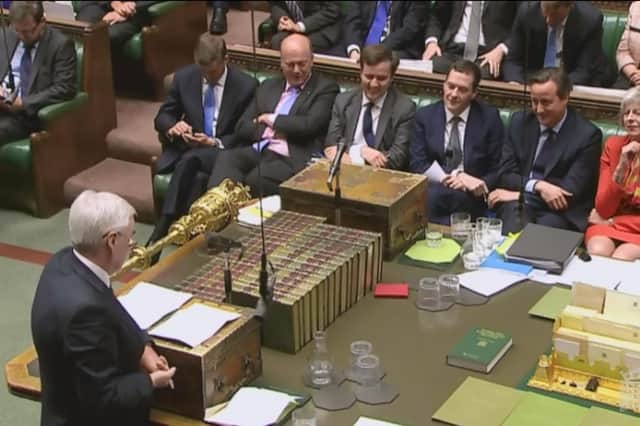Reading Hitler and Lenin does not make you a Nazi or a communist. We must examine the worst of our history – Alastair Stewart


When I was about to enter a Zoom call a few weeks ago, I remembered it was sitting right behind me. I scrambled to replace it. It was plain old embarrassment at having 'that' book.
James Gillespie's High School in Edinburgh is now making the same scramble. The school wants To Kill a Mockingbird removed from the syllabus for third years because of its depiction of race and the ‘white saviour’ narrative. The shift comes as part of an effort to 'decolonise' the curriculum.
Advertisement
Hide AdAdvertisement
Hide AdThe goal is admirable, but the method is wholly misguided. It is motivated by social embarrassment and not a new commitment to critical thinking. The school seems to be forgetting Scottish Qualification Authority examinations include questions like “discuss”, “compare”, “analyse”, and “evaluate”. There is nothing better than a controversial and seminal text for students to dissect.
Professor Jordan Peterson made this point, too. Writing as a means to secure grades is no guarantee of actual thinking. Writing requires you to evaluate and formulate your own argument, defend it, criticise it and give a conclusion. All of that for school-age students is contingent on material that ignites their passions.
Watering down a curriculum because it presents controversial language or problematical themes raises two points. First, the motivations for culturally cancelling Mockingbird are a gold mine for students to assess. Second, the story of how archetypal hero Atticus Finch has become a villain is a microcosm of broader societal debates. The book should be required thinking (never mind reading).
George Orwell and Ray Bradbury have been quoted to death on censorship and book burning. With no loss of irony, comparative dystopian literature was the subject of my Advanced Higher dissertation (ahem) some years ago. But it's Aldous Huxley who makes the most overlooked point on book banning: what if humans simply stopped caring?
Huxley feared that we would grow disinterested in literature that challenged the mind. Fast entertainment and faster pleasures make reading the more laborious choice. Thinking becomes too hard. We seem to be forgetting that getting youngsters engaged in a lifelong interest in reading is hard enough without worrying if texts are socially unacceptable.
General Mark Milley, chairman of the US joint chiefs of staff, said the American military need not apologise for fostering open-mindedness. He was commenting on the noted West Point Academy including critical race theory in their curriculum. He vigorously defended the choice, citing his own plethora of reading choices and how reading Mao and Lenin did not make him a communist.
My embarrassment at owning Hitler's book was centred on a fear of being misunderstood. “God, if someone saw me with that, they'd think I was a Nazi.” It has all the makings of a screengrab. But creating a hostile environment for even daring to understand something will doom us all.
How often do we hear it said that a book is sexist, violent or misogynistic? The 'N word’ appears around 40 times in To Kill a Mockingbird, but there is a difference between a book’s author being a racist and the book's characters. And there is an enormous difference between reading something and approving of it. There is a difference between a book that advocates something horrendous and academically discussing it.
Advertisement
Hide AdAdvertisement
Hide AdNo one seems to be saying that Harper Lee is a militant racist. That the accusation is not being levelled shows how contrived and hypocritical the complaints against Mockingbird are. We would condemn Lee if she wrote a book that skirted over the disgusting racism of her time. To Kill a Mockingbird wouldn't make it onto a reading list because it was fantastical nonsense disguising brutal realities.
Human rights campaigner Sir Geoff Palmer has said as much, too: “You can't solve racism by putting texts with uncomfortable realities in the bucket." Surely it's better, with all books or as many texts as students can get their hands on, to find the meaning in their message? If you feel lasting revulsion over the treatment of Tom Robinson, then that is a visceral, gut-punch memory.
Whether it's books or statues or movies or anything else that challenges our sensibilities, isn't that what we need? As a reminder that real suffering existed? We should keep everything we can from our history out in the open. Especially the worst and most problematic bits. Removing these things is congratulatory short-termism and long-term sabotage. Our culture is too fast-paced to reflect on anything not staring us in the face.
The issues which face us as a civilisation are seismic. They are almost incomprehensibly bad. Most understood Covid-19 with endless references to all the movies which featured a pandemic and where they went right and wrong. As we deal with climate change, will we strike The Grapes of Wrath from the reading list because it offends our sensibilities about the grim realities of environmental damage?
Students of all ages need a problem that grips them to investigate, tear to shreds or be inspired by. Reading the text itself should encourage students to read and search expansively. That will give way to the ability to digest, form opinions and write succinctly. It's a practised skill. The pleasure comes from injecting your own personality into it. To deny young people the chance to do that sets a horrifying precedent.
Alastair Stewart is a freelance writer and public affairs consultant. You can read more from Alastair at www.agjstewart.com and following him on Twitter @agjstewart.
A message from the Editor:
Thank you for reading this article. We're more reliant on your support than ever as the shift in consumer habits brought about by coronavirus impacts our advertisers.
If you haven't already, please consider supporting our trusted, fact-checked journalism by taking out a digital subscription.
Comments
Want to join the conversation? Please or to comment on this article.
